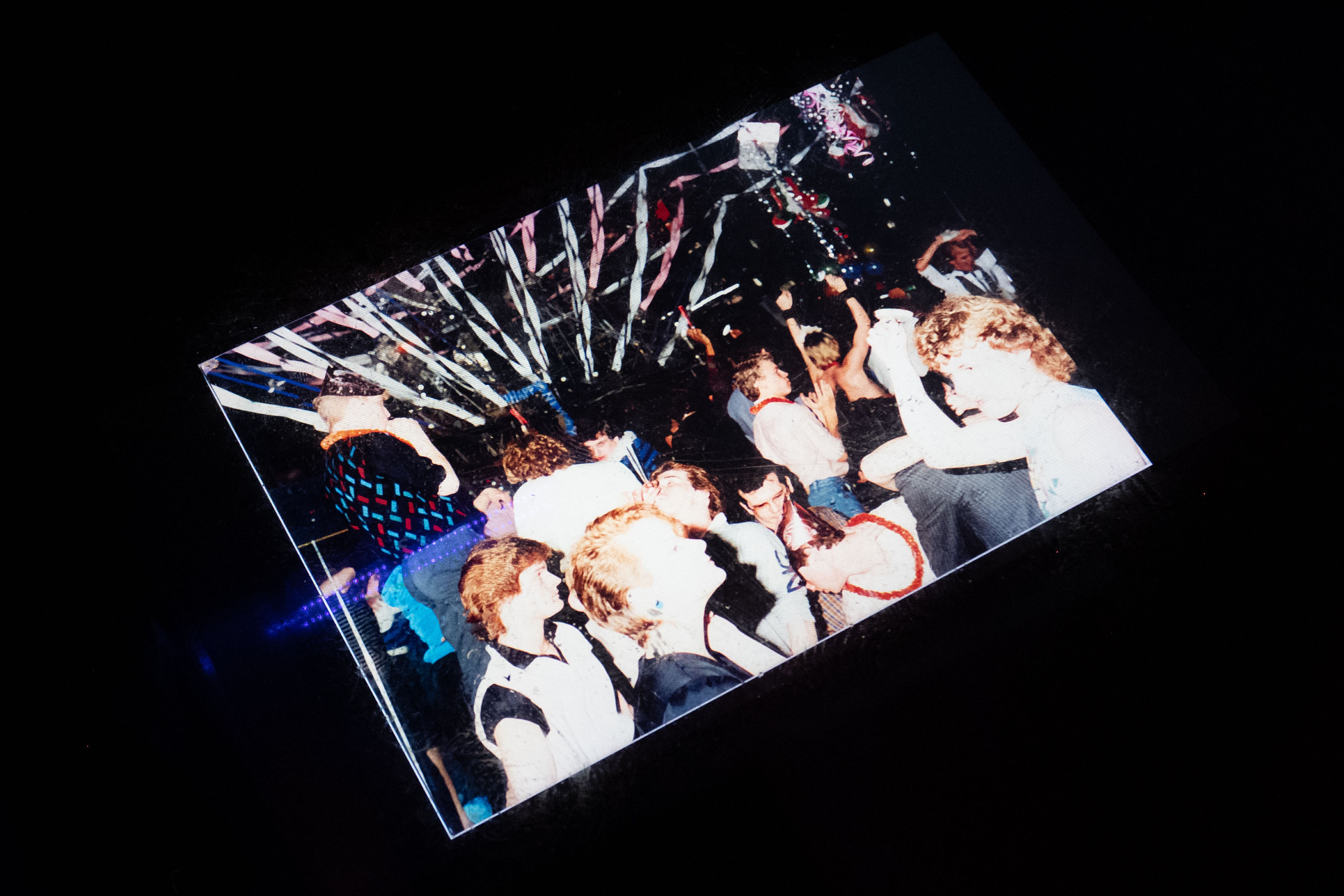Arts & Culture
A Conversation with Former Lusty Lady Employee and Author Elisabeth Eaves
Longtime Seattle peep show the Lusty Lady will close its doors in June. I called Elisabeth Eaves, who worked at the Lusty in the late '90s, to get her take on the place, stripping, and the peep show's imminent closure. Eaves went on from the Lusty Lady to get a graduate degree in international affairs and to write a book, Bare: The Naked Truth About Stripping. Currently an editor at Forbes Magazine in New York City, she is working on a travel memoir about her experiences over the last twelve years.

What was it like to work at the Lusty Lady?
I had a really good time working there, which may sound strange. There was a lot of camaraderie among the women who worked there, a lot of joking around and silliness and hanging out in the dressing room. I was also impressed with it as an operation; I felt very safe working there. Hearing about the closure strangely makes me a little bit nostalgic.
How did you end up getting the job?
I basically ended up there because I wanted to. I had an abiding curiosity about stripping. I’d seen all the cultural ideas, stereotypes, and I was just fascinated. It was glamorous but sort of tawdry and shameful at the same time, and I wanted to know what it was all about. So I started doing it.
What did you learn there about stripping, that culture and that industry?
Well, there’s a huge diversity of people doing it. There’s no one stripper, like there’s no one lawyer. There’s everybody from crack whores to law students in there, so it’s hard to generalize.
What do you think about the power dynamic inherent in stripping and how it affects issues of empowerment and exploitation?
I don’t think there’s just one answer to it. I don’t think it’s universally exploitative, or anything like that, but I’m not a cheerleader for it either. I’m not going to tell everybody to run out and do it and that it’s a good thing for you. But by all means, [go for it] if you want to.
I think the biggest hazard of stripping is not imminent dangers to your body or to your lifestyle; it’s the resume gap. Women get into for fun, or for a short period—which is what I did—and then they get reliant on the money and their options suddenly become really narrow. I think that’s the biggest danger—becoming dependent on it—because you can’t really strip for that long in your life. It’s the classic dead-end job, and it’s going to end sooner rather than later. That’s the disempowering part and the thing you need to be careful of.
Did you work with anybody at the Lusty Lady who was in that position?
Yeah, for sure. Some people were in and out, they were financing graduate school and moving on; and then there’s people who did it for ten years, fifteen years.
How did the pay compare to other jobs?
It got a little better than temping. For a young woman with few job skills, it provides pretty good money and pretty short, flexible hours, but it wasn’t like I got rich. Stripping is perceived as being a lot more lucrative than it actually is. You’re never going to make more per hour than a shrink or a lawyer. And the Lusty was less than that. But it’s fine money when you’re young and it’s interim.
What do you think about the pole-dancing class trend?
I think it corroborates my own feeling of wanting to check this out and see what it was like—it seemed sort of glamorous and fascinating and sexy to me. Pole-dancing classes make it clear that that’s actually quite common. Women want to try these things that are perceived as sexy and sexual. The fact that there’s a market just shows us something about the universality of this desire, to be a sex object, to be the center of attention in that way. People hate being sex objects, but they also kind of love being sex objects.
So given that there is a market for it, and that you said the Lusty Lady was so well-run, why do you think it failed? Was it the Internet?
Several things: One, you can get all kinds of explicit pornography on the Internet now. So that took away a segment of the market.
I know that neighborhood [downtown Seattle] has become totally gentrified, so that probably had something to do with it.
The general manager, in a couple of news stories, has pointed out that the collapse of WaMu had an impact because a lot of employees of WAMu went to the Lusty, or at least the manager seems to think so. So a general recession, which we’ve had, contributes to the customer base. It just sounds to me like they can’t support themselves. I don’t know what they’re charging these days, but it sounds like they’re just not staying in the black.
A final question: How did spending that year working at the Lusty affect and inform what you went on to do? Has it affected the way that you have lived?
I think the connection between me as a writer and me as a stripper is the impulse to see something weird and different—a desire for new experiences, unusual experiences, needing to see things for myself. The writer in me wants to go meet unusual people and see strange things, and going into the Lusty Lady was a bit like that for me. There was kind of this anthropological “I want to see what it’s like” to it.

What was it like to work at the Lusty Lady?
I had a really good time working there, which may sound strange. There was a lot of camaraderie among the women who worked there, a lot of joking around and silliness and hanging out in the dressing room. I was also impressed with it as an operation; I felt very safe working there. Hearing about the closure strangely makes me a little bit nostalgic.
How did you end up getting the job?
I basically ended up there because I wanted to. I had an abiding curiosity about stripping. I’d seen all the cultural ideas, stereotypes, and I was just fascinated. It was glamorous but sort of tawdry and shameful at the same time, and I wanted to know what it was all about. So I started doing it.
What did you learn there about stripping, that culture and that industry?
Well, there’s a huge diversity of people doing it. There’s no one stripper, like there’s no one lawyer. There’s everybody from crack whores to law students in there, so it’s hard to generalize.
What do you think about the power dynamic inherent in stripping and how it affects issues of empowerment and exploitation?
I don’t think there’s just one answer to it. I don’t think it’s universally exploitative, or anything like that, but I’m not a cheerleader for it either. I’m not going to tell everybody to run out and do it and that it’s a good thing for you. But by all means, [go for it] if you want to.
I think the biggest hazard of stripping is not imminent dangers to your body or to your lifestyle; it’s the resume gap. Women get into for fun, or for a short period—which is what I did—and then they get reliant on the money and their options suddenly become really narrow. I think that’s the biggest danger—becoming dependent on it—because you can’t really strip for that long in your life. It’s the classic dead-end job, and it’s going to end sooner rather than later. That’s the disempowering part and the thing you need to be careful of.
Did you work with anybody at the Lusty Lady who was in that position?
Yeah, for sure. Some people were in and out, they were financing graduate school and moving on; and then there’s people who did it for ten years, fifteen years.
How did the pay compare to other jobs?
It got a little better than temping. For a young woman with few job skills, it provides pretty good money and pretty short, flexible hours, but it wasn’t like I got rich. Stripping is perceived as being a lot more lucrative than it actually is. You’re never going to make more per hour than a shrink or a lawyer. And the Lusty was less than that. But it’s fine money when you’re young and it’s interim.
What do you think about the pole-dancing class trend?
I think it corroborates my own feeling of wanting to check this out and see what it was like—it seemed sort of glamorous and fascinating and sexy to me. Pole-dancing classes make it clear that that’s actually quite common. Women want to try these things that are perceived as sexy and sexual. The fact that there’s a market just shows us something about the universality of this desire, to be a sex object, to be the center of attention in that way. People hate being sex objects, but they also kind of love being sex objects.
So given that there is a market for it, and that you said the Lusty Lady was so well-run, why do you think it failed? Was it the Internet?
Several things: One, you can get all kinds of explicit pornography on the Internet now. So that took away a segment of the market.
I know that neighborhood [downtown Seattle] has become totally gentrified, so that probably had something to do with it.
The general manager, in a couple of news stories, has pointed out that the collapse of WaMu had an impact because a lot of employees of WAMu went to the Lusty, or at least the manager seems to think so. So a general recession, which we’ve had, contributes to the customer base. It just sounds to me like they can’t support themselves. I don’t know what they’re charging these days, but it sounds like they’re just not staying in the black.
A final question: How did spending that year working at the Lusty affect and inform what you went on to do? Has it affected the way that you have lived?
I think the connection between me as a writer and me as a stripper is the impulse to see something weird and different—a desire for new experiences, unusual experiences, needing to see things for myself. The writer in me wants to go meet unusual people and see strange things, and going into the Lusty Lady was a bit like that for me. There was kind of this anthropological “I want to see what it’s like” to it.




